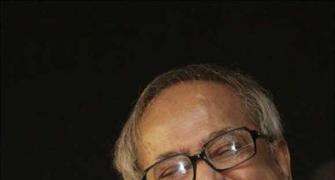With National Democratic Alliance allies Janata Dal-United and Shiv Sena breaking ranks with the Bharatiya Janata Party to support Mukherjee, the number on his rival P A Sangma's side has dwindled to 3.10 lakh and he only has Mamata Banerjee's Trinamool Congress left to increase his vote share.
Even if Trinamool decides to dump the UPA and back him, Sangma's number will increase only to 3.56 lakh, which is well below the 5,49,442 votes required for election as President and occupy the Rashtrapati Bhavan on Raisina Hills if all the 10.98 lakh votes are polled.
According to the vote value of each party, Mukherjee is expected to garner around over 6.29 lakh. The supporters of 77-year-old finance minister include the Samajwadi Party, the Bahujan Samaj Party, the Communist Party of India-Marxist, Forward Bloc and Janata Dal-Secular among others.
The UPA figures had come down to 4.12 lakh after Trinamool Congress decided against the Congress choice. But with the support of the SP (66,688 vote value), BSP (45,473), JD-U (40,737), Shiv Sena (18,495), JD-S (6,138) and CPI(M) and Forward Bloc (around 41,000) offering support, Mukherjee can expect vote share of about 6.29 lakh.
For Sangma, the number game is not in his favour as the NDA strength has been reduced to 2.43 lakh after the JD-U and Shiv Sena offering support to his rival.
However, the All India Anna Dravida Munnetra Kazhagam (36,920 vote value) and Biju Janata Dal (30,125), his votes will rise to 3.10 lakh and he can muster 3.56 lakh votes if Trinamool decides to support him.
The electoral college for the July 19 poll is made up of 4,896 members -- 776 MPs and 4,120 MLAs -- who have a vote value of 10.98 lakh votes. If all the votes are polled, a candidate who gets more than 5,49,442 votes will be declared the winner.
The Congress has already appealed to all political parties to support Mukherjee's candidature.
According to the election procedure, the returning officer will first determine the valid votes and then declare the votes needed for victory. If no candidate gets more than 50 per cent of the first preference votes, the counting will proceed to the second round during which the candidate having the lowest value of votes of first preference is excluded.
His votes are distributed among the remaining candidates according to the second preference marked on ballot papers.







